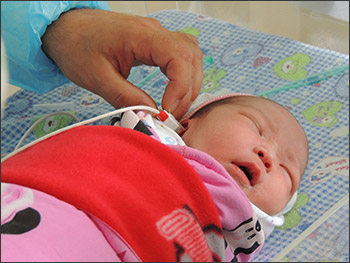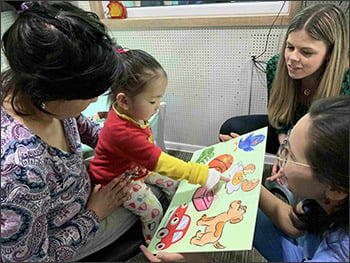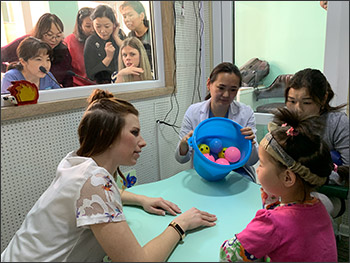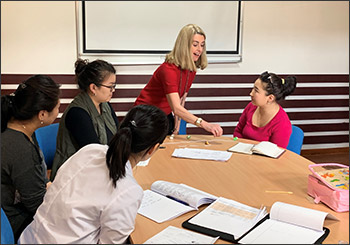Developing Hearing Health Services in Mongolia for Children With Hearing Loss
July 2019
Paige Stringer and Karen C. Harris
"Every child deserves to hear their parents' lullaby."
The words uttered by the President of the Ulaanbaatar Rotary Club Peace Avenue still echo in our ears. This mantra has given life to an idea that a handful of Mongolians imagined years ago—a dream that Mongolian children born deaf or hard of hearing could one day overcome communication barriers to achieve their potential. Although hearing loss intervention is not a new concept in Mongolia, the ability to identify, treat, and habilitate an infant or young child prior to the permanent effects of auditory deprivation on speech development has felt out of reach for some time.
This changed in 2016 when the Mongolia National Center for Maternal and Child Health (NCMCH) entered into a partnership with the Global Foundation For Children With Hearing Loss, an international nonprofit organization based in the United States. The aim is to address four key areas essential for babies and young children with hearing loss in learning to listen and speak: early identification, timely fitting of hearing aids or cochlear implants, access to locally based trained professionals, and family education.
Mongolia Program Overview
Paige Stringer
The Global Foundation For Children With Hearing Loss believes that the most sustainable approach to international work is to partner with in-country health care and education professionals to help them establish the expertise and services they need to support their own children with hearing loss. Instead of following the traditional humanitarian model of direct service, our organization takes a long-term view by working with our partners to develop local resources for babies and young children with hearing loss through training and education, systems development, public awareness, and research support.
As a first step for our Mongolia program, the Global Foundation collaborated with the Rotary Club of Ulaanbaatar Peace Avenue and with Seattle-area Rotary clubs between 2016 and 2018 to fund and distribute hearing screening devices to NCMCH and all five birthing hospitals in the capital city of Ulaanbaatar. We networked the hospitals to a centralized server that enabled appropriate tracking of screening data and management of referrals. It was the first time that these hospitals had the resources to conduct newborn hearing screening. The Global Foundation's equipment partner Path Medical provided in-country training on hearing screening equipment use to Mongolian nurses and doctors. The Mongolian medical community took on the challenge of establishing newborn hearing screening procedures and integrating them into their standard of care across the city.
In 2018, the first full year of implementation, doctors and nurses in Ulaanbaatar screened approximately 33,000 newborns for hearing loss—a sevenfold increase from 2016, the last year before the start of this program. This represented about half of the country's annual newborn population, and more than 100 were recommended for additional follow-up and support. We are now working with the Mongolian government and with our local partners to explore avenues for national expansion of the newborn hearing screening program.

Newborn hearing screening in Ullaanbaatar enabled 33,000 babies to be tested for hearing loss in 2018.
The Global Foundation training initiatives are a key element of our work. A team of credentialed pediatric audiologists and Listening and Spoken Language specialists volunteer their time and expertise to the Global Foundation's programs. They designed our training curriculum. They travel to the country to teach the material to the same group of participants over time. The curriculum combines lectures with in-clinic practica to provide participants with the opportunity to apply what they learn. The Global Foundation also offers workshops for families, so that we can answer questions about their children's hearing loss and provide guidance on how they might support their children's listening and spoken language development at home. We eventually prepare the participants to train others in the country, making the benefits both exponential and sustainable. The Global Foundation has employed this same type of model in Vietnam with great success, and we anticipate the same outcomes in Mongolia.
In 2017, the Global Foundation initiated its training program in pediatric audiology and auditory-verbal practice for Mongolian medical professionals, therapists, and teachers. We customized the training program to enhance existing Mongolian professional expertise in pediatric audiology and auditory-verbal practice. The goal is to provide all babies and young children who screen positive for hearing loss with the local support they need to use hearing technology and learn to listen and speak.
Overview of Global Foundation Third Mongolia Training Workshop (March 2019)
Paige Stringer
The Global Foundation For Children With Hearing Loss conducted its third training session in Mongolia in March 2019, in partnership with NCMCH. Mongolian audiology doctors, technicians, nurses, therapists, and teachers came from hospitals, clinics, and early intervention programs around Ulaanbaatar to continue their participation in our training program.
Pediatric audiologists Karen Harris and Claire Schleicher, and certified Listening and Spoken Language specialists Sherri Fickenscher and Kathryn Wilson, accepted the Global Foundation's invitation to join our professional training team for this week-long training session. These professionals live and work in different corners of the United States and serve patients representing a wide demographic range. Despite their varied specialties and backgrounds, they formed a strong team fueled by their passion for pediatrics and a desire to contribute to the Global Foundation and to Mongolia's efforts to strengthen the country's own support system for children with hearing loss.
Insight to the Mongolia Audiology Training Workshop
Karen C. Harris
The Global Foundation financed the construction of a new audiology room and audiology equipment at NCMCH, which expanded the hospital's test protocol to include behavioral hearing testing for young children. The first task on a Saturday before the start of our training workshop was to help an equipment company technician install the final pieces of audiometry equipment for the room and calibrate the equipment. What once was a little-used storage room became a beautiful clinic set-up with a sound-resistant test room large enough for sound-field testing. The next step was to teach the Mongolian audiologists the skills required to behaviorally test one of the most challenging age groups—infants and toddlers.

Teaching Mongolian clinicians how to use a Spondee board for speech perception testing.
Audiology training for the Mongolian ENT doctors, nurses, and audiology technicians provided instruction on guidelines for behavioral testing, including decibel levels, how to condition a child, and strategies for maximizing testing. Keeping in mind that these professionals have years of experience with conventional audiologic testing, the training focused on the specific skills needed for Conditioned Play Audiometry (CPA), Visual Reinforcement Audiometry (VRA), and Visual Reinforcement Operant Conditioned Audiometry (VROCA).
Some of the more challenging nuances of these tests are knowing when a child is conditioned, spotting a false positive response, and determining when a child has become fatigued or habituated to the testing. An audiology instructor cannot impart these skills through lecture alone. Therefore, we brought in multiple test subjects—some with typical hearing and others wearing amplification—for the clinicians to practice testing. Each clinician took several turns at the audiometer and in the booth as a test assistant. Some of the test subjects seemed to enjoy playing the games and continued to participate in CPA testing, enabling not just one clinician but several clinicians to practice.

Conditioned Play Audiometry practicum during the Audiology Training workshop.
More difficult test subjects provided important examples of how to know when a child is conditioned to the task and when to call it quits. As so many audiologists know, it can be challenging to decide at what point to stop testing when families have traveled hundreds of miles from remote areas for the appointment. We all want to get the information we need in order to inform families appropriately and to decide on next intervention steps. Some of the more challenging patients opened up an important conversation in the training workshop about testing strategies, such as giving the child a break, using motivators like snacks or prizes, or changing the type of test (e.g., transitioning to VRA after attempting CPA).
Claire and I reminded the Mongolian clinicians of other objective tools, such as tympanometry and otoacoustic emission testing, which clinicians can use to obtain meaningful information. By piecing together various results obtained during an appointment, the clinician can get enough of a picture of a child's hearing abilities to make some recommendations on how to move forward.
Another part of audiologic testing that is important among the pediatric population is speech perception testing. I brought a picture board from the United States that I had developed for this workshop. It featured photos of Mongolian spondee words based on a word list that Mongolian therapists had previously provided to the Global Foundation. The therapists had explained that a clinician can use this picture board to measure a speech reception threshold for children who can identify words by pointing to the photo, even if they are unable to vocalize the word yet. This tool proved to be helpful when testing some of the young patients and provided the Mongolians with a starting point for speech testing.
We all agreed that there was a need for additional speech testing tools appropriate for this age group because no pediatric speech test battery exists in the Mongolian language. With limited time and equipment available to comprise a linguistically balanced speech word list, the Mongolian clinicians devised lists of one- or two-syllable words that young Mongolian children would know. The final result was a 100-word list unofficially dubbed the Early Pediatric Mongolian Speech Test. This word list served as an important tool for training the Mongolian clinicians how to predict amplification outcomes and how to validate hearing aid or cochlear implant programming.
Meanwhile, the Auditory-Verbal Therapy (AVT) training workshop concurrently took place. The Global Foundation volunteer team of Listening and Spoken Language professionals provided instruction to Mongolian therapists and teachers about how to (a) assess the children's audition and language levels while wearing their hearing technology and (b) identify goals and strategies for families to help their child progress using the Global Foundation developmental charts. These charts are founded on English-based assessments but are customized to the nuances of the syntax and structure of the country's native language. The workshop also featured live therapy sessions with children and their families.

Teaching Mongolian therapists an AVT strategy for audition during the AVT training workshop.
The Global Foundation promotes an interdisciplinary approach. Not only were the Global Foundation trainers teaching skills specific to their respective areas of expertise, but they also stressed opportunities to demonstrate the effectiveness of collaboration across teams in achieving a common goal. Trainers provided observations of hearing testing or therapy sessions to the training participants to help them better understand what their team members in other functions are doing daily with their patients. All participants reported significant benefit in learning about their cohorts' expertise and job duties, and they recognized that by working together as a multidisciplinary team, children's speech and language outcomes will improve.
Personal Reflections on the Experience
Karen C. Harris
When Paige Stringer invited me to join the Global Foundation For Children With Hearing Loss team as a professional trainer for the Mongolia Audiology Program, I did not hesitate to accept. I have known Paige and her work with the Global Foundation for many years, and I have admired the complete intervention and multidisciplinary approach of the organization's model. Paige's efforts to establish key relationships in the countries where the Global Foundation works has enabled the organization's programs to unfold successfully.
After the initial excitement settled, I realized that I knew very little about Mongolia's culture. My previous global health outreach experience in Guatemala taught me the importance of understanding the culture in order to be respectful of the people with whom I would be engaging. I knew I had a lot to learn in the months leading up to this trip. I watched the documentary, The Eagle Huntress, and became fascinated with the nomadic lifestyle and women's roles in the Mongolian culture. Although Mongolia is not considered a matriarchal society, women historically have a much larger role in running the household than in some other Asian cultures, and women are highly respected in leadership roles in modern society. Upon arriving in Mongolia and meeting the Mongolian professionals, I was impressed by their female representation and how they empower women and young girls to pursue careers. It came as no surprise that the audiology doctors I worked with during the training were all female. They proved to be incredibly motivated and hardworking, as demonstrated by their knowledge of many languages, international educational experiences, and the surprisingly large numbers of patients whom they treat each day.
Several cultural differences brought comedic relief throughout the long work days. In Mongolia, it is customary to shake hands with a person should you accidentally step on their foot or bump into them. I discovered this during one of the training sessions when a Mongolian doctor's foot accidentally touched mine under the table. Without skipping a beat, she reached across and grabbed my hand while continuing to talk as if nothing had happened. To the rest of the Mongolians, this was a perfectly natural occurrence. Claire and I exchanged glances for a moment before the doctor caught on and started to laugh, as she explained why she so suddenly took my hand.
Our Mongolian hosts fed us very well throughout the trip, and often, we were the recipients of light-hearted teasing if we were not as hungry as they were or could not finish our meal. I know how important finishing a meal can be in many cultures. However, this proved to be challenging when a Mongolian person would be right behind me, replenishing my plate of food. One thing I saw firsthand was that laughter really is the same in any language or culture.
The Mongolians also took this opportunity to seek assistance in adjusting the maps of some of their most challenging cochlear implant patients. These patients had an array of comorbidities such as autism spectrum disorder (ASD), cortical blindness, and undeveloped cochleae. One child with ASD had not worn his processor in months after experiencing hypoxia-induced migraines secondary to the severe winter air pollution. Upon entering this room full of strange adults, he appeared terrified, but he gravitated to where I was sitting and playing with some toys. I quickly gained his trust as we played with the toys together. I gently kissed his hand with the toy bear, then his cheek, and then his magnet site. The family and Mongolian clinicians observed from the other side of the table as I took my time with him, gently stroking his cheek with his detached processor coil. About 45 minutes later, the relaxed child sat hugging his parents, which allowed me to place the coil on his magnet—and successfully remap his implant.
This encounter initiated an important conversation about slowing down and taking the time that a child needs to feel comfortable in the appointment. By building the child's trust, I brought him to a place where he knew he could feel safe when the time eventually came to place the coil. This resulted in accomplishing exactly what the family came for that day and provided a model to the family for moving forward with increasing the child's cochlear implant use.
After completion of the training workshop, the Global Foundation arranged a tour for us, and we ventured out to the Mongolian countryside, where we explored the vast plains and mountains. A female park ranger, referred to as "the protector of the mountains," led us through Gun Galuut National Park, where she pointed out nearly extinct argali sheep. We met several nomadic families along the way who graciously welcomed us into their gers, fed us, and encouraged us to take photos. They saddled up their horses and took us for a trek over the hills and through a herd of wild horses. They shared their daily rituals with us. It fascinated me to learn that these families pack up and move their entire lives with every change in season.
On our last evening, we took a stroll into the dark night. Never has the sky looked so big and unfamiliar with this hemisphere's blanket of constellations. There was no better place to reflect on the week's accomplishments than standing under the stars in the Mongolian countryside, cool air brushing my cheeks. The feeling of fulfillment completely overcame me. I had just traveled from the other side of the world to have this amazing experience of sharing my knowledge with an incredible group of women. I taught them skills that they will continue to implement for years to come, touching many lives along the way by improving a child's access to sound and showing them that they can learn to listen and talk. The difference we are making is tangible. This is the feeling that fuels audiologists to do what we do—and it's why I feel so empowered to share my skills and knowledge with the world.
About the Global Foundation for Children With Hearing Loss
The Global Foundation for Children With Hearing Loss aims to make a direct and lasting impact on children around the world who are deaf or hard of hearing by providing them access to the early identification, hearing technology, locally based expertise, and resources they need to learn to listen and talk and achieve their full potential. The Global Foundation collaborates with health care and education partners in developing countries to identify and address gaps in the local system of support for babies and young children with hearing loss and their families. Established in 2009, the Global Foundation for Children With Hearing Loss currently has programs in Vietnam and Mongolia. Learn more at www.childrenwithhearingloss.org or by visiting the Global Foundation for Children With Hearing Loss Facebook page.
The Global Foundation for Children With Hearing Loss welcomes pediatric audiologists, speech language pathologists, early intervention specialists, oral deaf educators, and certified Listening and Spoken Language professionals with at least five years of experience to apply to join its professional volunteer team. If you are interested in helping young children with hearing loss in developing countries, please visit www.childrenwithhearingloss.org for details.
About the Authors
Paige Stringer, MA, is executive director and founder of the Global Foundation For Children With Hearing Loss. The international nonprofit organization works with medical and education partners in developing countries to establish sustainable, locally based professional expertise and services that babies and young children with hearing loss need in order to learn to listen and speak and to reach their potential. The Global Foundation has worked in Vietnam since 2010, in Mongolia since 2016, and also had a program in Ecuador. Since 2015, Stringer has contributed to committee work at the World Health Organization in Geneva focused on raising awareness for hearing loss globally. She previously served on the board of directors of the Coalition for Global Hearing Health. Several organizations have recognized Stringer with honors, including the 2018 AG Bell Association Award for International Service and the 2014 American Academy of Audiology Humanitarian of the Year Award.
Karen C. Harris, AuD, CCC-A, is an audiologist at Children's Hospital Colorado. She graduated with her doctorate of audiology from the University of Washington in 2015. Harris is the current vice president of education for the Colorado Academy of Audiology. Her clinical focuses include managing the inpatient program, pediatric vestibular assessment, diagnostic testing, and hearing aids. Harris's passion for global health outreach is deep-rooted, as she helped develop audiology clinics in rural Guatemala in addition to developing an annual outreach program to Guatemala for AuD students. She joined the Global Foundation for Children with Hearing Loss in 2019 to lend her expertise in training Mongolian health professionals in pediatric audiology standards for infants and toddlers.











